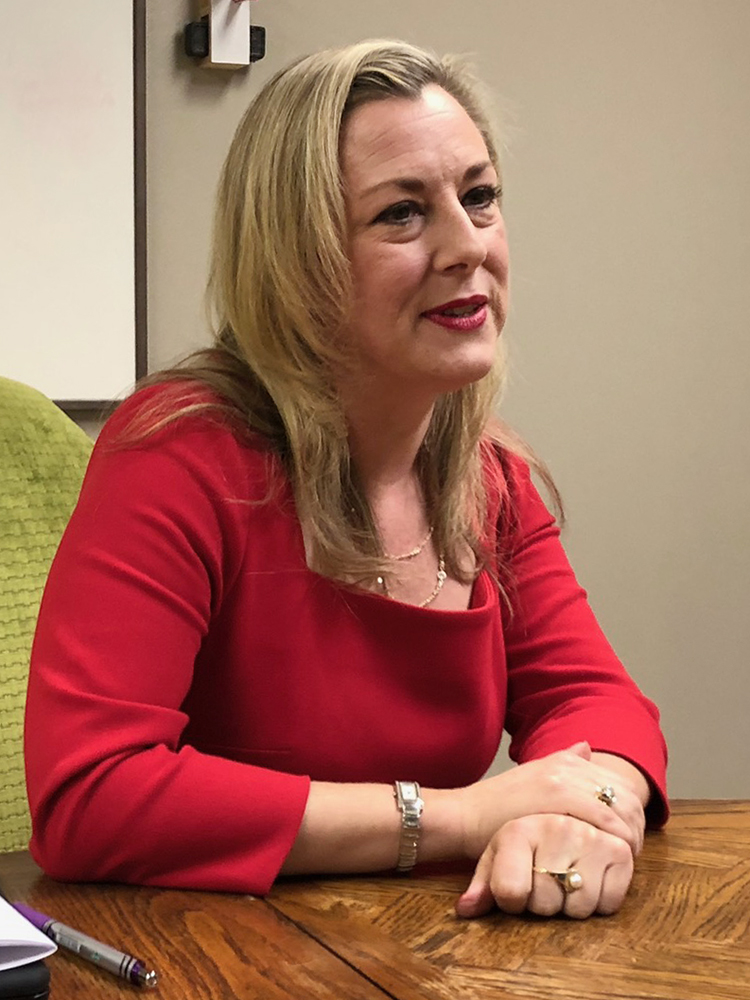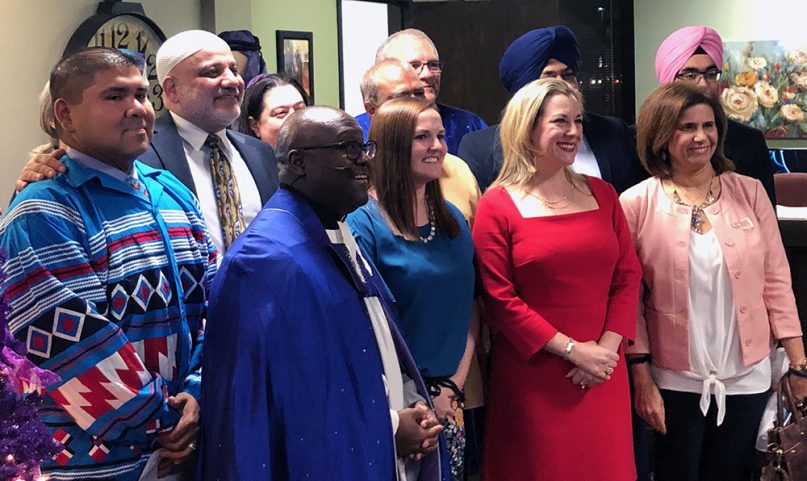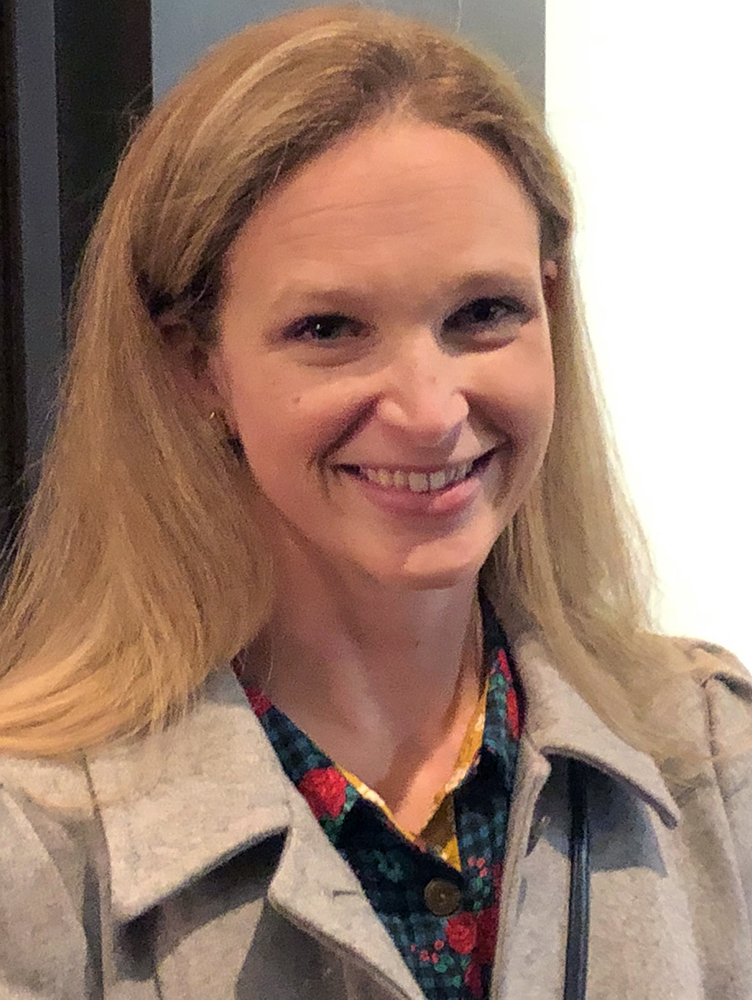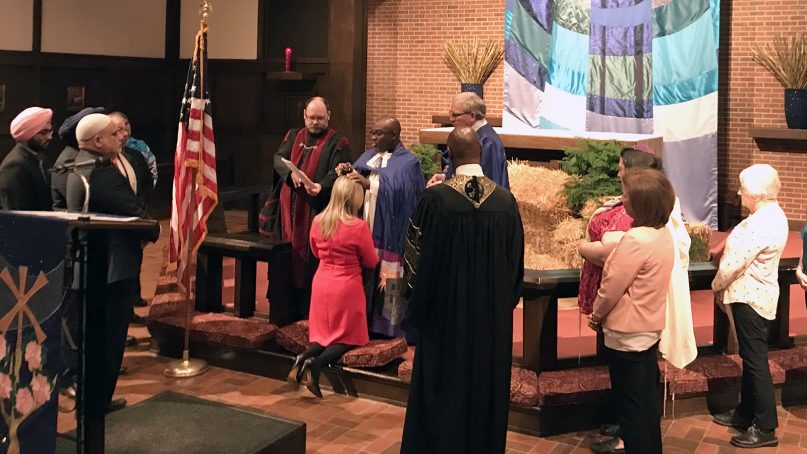OKLAHOMA CITY (RNS) — U.S. Rep.-elect Kendra Horn, D-Okla., knelt at the front of the sanctuary as the Rev. Joseph Alsay, rector of St. Augustine of Canterbury Episcopal Church, anointed her with chrism, a consecrated oil.
“Kendra, may God bless you with enough foolishness to believe that you really can make a difference in this world so that you are able, with God’s grace, to do what others claim cannot be done,” Alsay said as he prayed over Horn.
He then invited other religious leaders to join him in prayer.
Representatives of nearly a dozen religious traditions — Baha’i, Buddhist, Christian, Hindu, Jewish, Muslim and Sikh leaders among them — took part in an interfaith prayer service Sunday night (Dec. 16) for Horn, who pulled off one of the biggest upsets of the 2018 midterm elections.

U.S. Rep.-elect Kendra Horn, D-Okla., before an interfaith prayer service for her at St. Augustine of Canterbury Episcopal Church in Oklahoma City. RNS photo by Bobby Ross Jr.
The public demonstration of her faith marked a transformation of sorts for Horn, a 42-year-old native Oklahoman who grew up Southern Baptist but said she fell in love with the Episcopal Church’s “combination of intellect and liturgy” as an adult.
“My faith has always been something more personal to me, so it has been an interesting journey working on sharing that and my expression of it,” Horn said in an interview with Religion News Service before the prayer service.
In one of the reddest of the red states, Horn defeated incumbent Republican Steve Russell by 1.4 percentage points in the Nov. 6 general election, turning Oklahoma’s 5th Congressional District blue for the first time in 44 years.
Horn received 121,149 votes (50.7 percent) to Russell’s 117,811 votes (49.3 percent). A pre-election analysis by FiveThirtyEight had given her only a 1 in 15 chance of winning.
Political observers pointed to Horn’s engaging personality and laser-like focus on issues important to constituents, such as health care and education, as crucial factors in her unexpected victory.
Changing demographics — younger and more Democratic-friendly — in the urban and suburban district that includes Oklahoma City didn’t hurt either, analysts said.
But in a district where evangelical Christians represent about half the voters — and a state where 3 in 4 residents describe themselves in Gallup polling as “moderately religious” or “very religious” — Horn also showed a willingness to engage people of faith.
“Kendra is a model for candidates across the country,” said Michael Wear, who directed former President Barack Obama’s faith outreach during his successful 2012 re-election campaign. “She did not pretend to be someone she is not. She showed up, speaking to shared values and calling out the better angels of all voters, even those who might not be expected to vote Democratic.
“Because she was willing to authentically meet evangelicals where they are and ask for their votes, she was able to give her candidacy a chance even in a deep red district,” added Wear, author of “Reclaiming Hope: Lessons Learned in the Obama White House about the Future of Faith in America.”
Oklahoma’s 5th District was one of 31 congressional districts nationally where Vote Common Good, a group of progressive evangelicals, brought its bus tour and staged pre-election rallies. Democratic challengers unseated Republican incumbents in 16 of those districts. The group describes itself as nonpartisan but opposed to President Donald Trump’s agenda.

U.S. Rep.-elect Kendra Horn, center right in red, D-Okla., poses with religious leaders after an interfaith prayer service for her at St. Augustine of Canterbury Episcopal Church in Oklahoma City on Dec. 16, 2018. RNS photo by Bobby Ross Jr.
Doug Pagitt, a Minnesota pastor and Vote Common Good’s executive director, said one result of the group’s efforts was that Democratic candidates such as Horn realized they could, in fact, talk publicly about their faith.
“That was a really new experience for a lot of Democrats because Democrats don’t often reach out to faith groups,” Pagitt told RNS.
Horn, an attorney and activist, traces the development of her faith to women important in her life.
Those women include her late maternal great-grandmother, Mattie Creeach, who stayed busy cooking and serving at the First Baptist Church of Chickasha, a small town about 40 miles southwest of Oklahoma City.
“She was an example of a consummate servant,” said Horn, the first Democratic woman elected to Congress from Oklahoma. “She never had a lot — she had five girls —and they were always scraping everything together. But no matter what, if anyone needed anything, she was there to do it.”
On her father’s side, Horn grew up hearing about her great-grandparents, who were in the grocery business, and how they gave away food to people who were destitute and hungry during the Great Depression.
They didn’t talk about their religion, Horn said. They lived it.
But the Vote Common Good experience has made Horn more open to talking about how her faith informs her desire, for example, to serve marginalized communities, she said.
“Service, justice and faith require creating paths to right historical wrongs by erasing the remnants of racism, sexism and other barriers that relegate our idea of leadership and faith to a narrow description of race, color and religion, based in a narrow power dynamic,” Horn told the crowd at Sunday’s interfaith prayer service.

Ali Dodd, a 35-year-old Republican mother, voted for U.S. Rep.-elect Kendra Horn, D-Okla., and came to an interfaith prayer service for Horn at St. Augustine of Canterbury Episcopal Church in Oklahoma City on Dec. 16, 2018. RNS photo by Bobby Ross Jr.
Ali Dodd, a 35-year-old Republican mother who came to the service, described herself as “elated” by Horn’s election.
Dodd characterizes herself as a fiscal conservative. She indicated that she votes for the candidate she favors — not strictly along party lines. She didn’t support Trump in 2016, but she did vote for Oklahoma Republican U.S. Sen. James Lankford, a pastor who occasionally preaches at the large Southern Baptist church just across the street from St. Augustine of Canterbury Episcopal Church.
“Why wouldn’t I support her?” Dodd said of Horn. “She’s not going to represent just Democrats. She’s going to represent us all. I find it really important, whether we’re Republicans or Democrats, to support her in any way I can. I know she’ll listen.”
Another attendee, Mike Korenblit, who is Jewish, said he started wearing a yarmulke after Trump’s election to show support for marginalized communities.
“I was Jewish and proud of it. I belonged to the temple and the synagogue. But nobody would have known it,” said Korenblit, who noted that he was as surprised by Horn’s 5th District win as he was by Hillary Clinton’s defeat in 2016. “Now they do, wherever I go.”
Sunday’s service celebrated the election of Horn — a St. Augustine parishioner — and focused on the need for unity among people of diverse backgrounds.
“We come together to pray for and with Kendra — to offer our petitions to the God who has made all humanity from one blood,” said Alsay, who organized a similar service for Oklahoma City Mayor David Holt before his swearing-in this past spring.
Holt, a fellow St. Augustine parishioner and former Republican state senator, declined to say whether he voted for Horn. However, the top elected official in this city of 650,000 residents stressed that he supports her now. The mayor attended Sunday’s service with his wife and two children and gave a reading from James 1:22-25, 27.
“It’s a diverse community we both represent here in Oklahoma City, and many kinds of diversity are encompassed in that, and religious diversity is certainly part of that,” said Holt. “I think we both felt as we took office that that was an important thing to acknowledge.”
Imam Imad Enchassi of the Islamic Society of Greater Oklahoma asked that God would inspire Horn “to be a pioneer, a trailblazer.” L.S. Multani of Sikh Gurudwara of Oklahoma prayed that Horn would be blessed “with wisdom, compassion, faith and a sense of what is fair.” Charlene Morrow of the Urantia Book Society of Oklahoma asked for “continued strength and courage” for Horn.
“Peace be, peace be, peace be with you, and God be with you, congratulations,” said Venkataraman Kalyanaraman of the Oklahoma Hindu Temple.
Giving the homily at the end of Sunday’s service, Horn said that throughout her two-year congressional campaign, she began and ended each day with these words from St. Francis of Assisi:
“Lord, make me an instrument of your peace: where there is hatred, let me sow love; where there is injury, pardon; where there is doubt, faith; where there is despair, hope; where there is darkness, light; where there is sadness, joy.
“O divine Master, grant that I may not so much seek to be consoled as to console, to be understood as to understand, to be loved as to love. For it is in giving that we receive, it is in pardoning that we are pardoned, and it is in dying that we are born to eternal life.”





